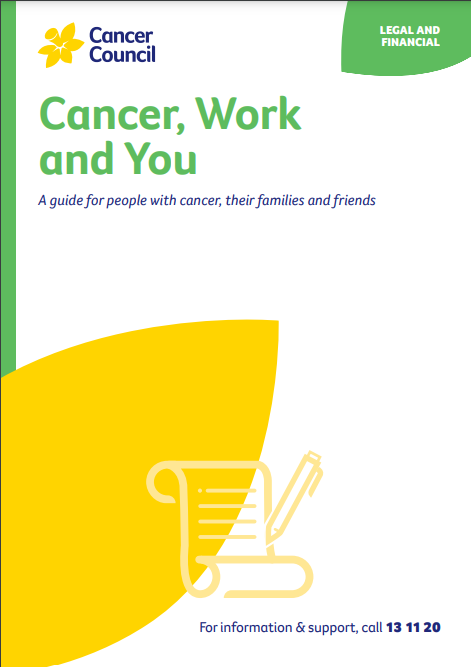- Home
- About Cancer
- Coping with a diagnosis
- Cancer, work and you
- For workers
- Coping with side effects
Coping with side effects
The main treatments for cancer are chemotherapy, radiation therapy and surgery. Other treatments, such as hormone therapy, targeted therapy and immunotherapy, may be used for some types of cancer. These treatments may have side effects that make it harder to do your job. This section provides tips for managing some of the most common side effects.
Learn more about:
- Overview
- Fatigue and tiredness
- Thinking and memory changes
- Nausea and vomiting
- Increased risk of infections
- Changes in how you look
Overview
It can take time to recover from the side effects of treatment. Making changes to your work hours and environment may make things easier. If treatment side effects stop you from working, your doctor may be able to change your treatment or prescribe medicine to help you feel better. Always ask your doctor about possible side effects of medicines, and tell your treatment team about any side effects that you have.
Some drugs cause drowsiness and make it hard to think clearly or operate heavy machinery safely. Side effects can be physical and they can be emotional. Feeling sad or depressed during or after treatment is common. Talk to your doctor if you are feeling down, see our Emotions and cancer or visit Beyond Blue.
Complementary therapies, such as meditation, yoga, massage and acupuncture, may improve the side effects of treatment. There is evidence showing that physical activity may also help manage the side effects of treatment for certain cancers.
→ READ MORE: Fatigue and tiredness
For more tips and information about managing side effects, see our general sections on Chemotherapy, Radiation therapy, Surgery, Targeted therapy, Immunotherapy and Complementary therapies, or call 13 11 20 for support.
Podcast: Coping with a cancer diagnosis
Listen to more of our podcast for people affected by cancer
More resources
Brooke Russell, Principal Occupational Therapist, WA Cancer Occupational Therapy, WA; Bianca Alessi, 13 11 20 Consultant, Cancer Council SA; Dr Prunella Blinman, Medical Oncologist, Concord Cancer Centre, Concord Repatriation General Hospital, NSW; James Chirgwin, Physiotherapist, The Wesley Hospital, QLD; Danielle Curnoe, Consumer; Simon Gates, Barrister, Tasmanian Bar, TAS; Justin Hargreaves, Medical Oncology Nurse Practitioner, Bendigo Health Cancer Centre, VIC; Kaylene Jacques, Director, People and Communications, Cancer Council NSW; Alex Kelly, Senior People Attraction Advisor, Human Resources, Allianz Australia Insurance, NSW; Legal reviewer; Georgina Lohse, Social Worker, GV Health, VIC; Lesley McQuire, Consumer, Cancer Voices NSW.
View the Cancer Council NSW editorial policy.
View all publications or call 13 11 20 for free printed copies.
Need to talk?
Support services
Coping with cancer?
Speak to a health professional or to someone who has been there, or find a support group or forum
Need legal and financial assistance?
Pro bono services, financial and legal assistance, and no interest loans
Cancer information
Dealing with the diagnosis
Common reactions to a cancer diagnosis and how to find hope
Resource hub
Guides, fact sheets, videos, podcasts and more for people with cancer, their families and friends

